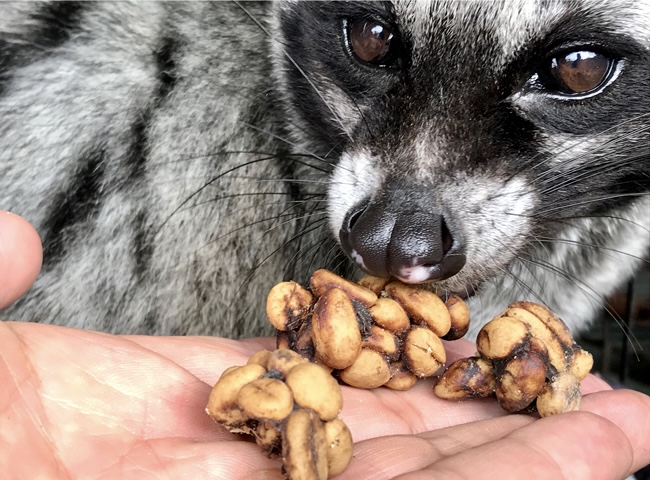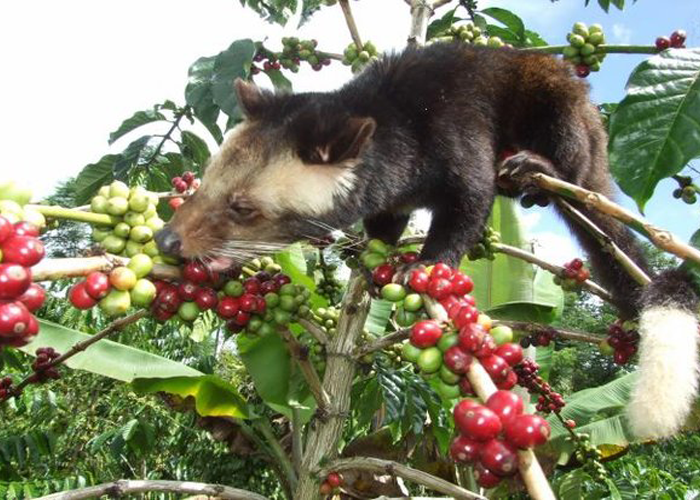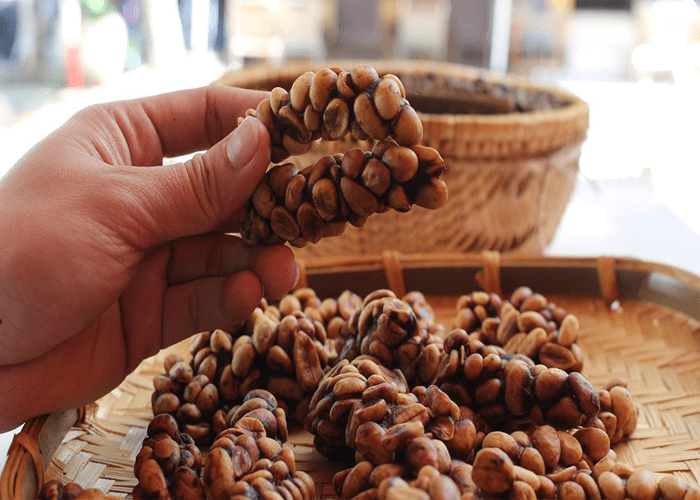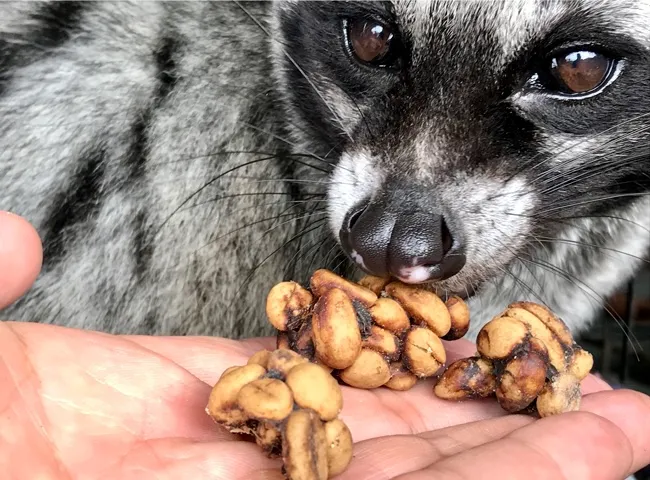If I were to inhabit the body of an animal for just one day, I might choose the weasel. Why, you ask? Well, it’s quite simple. Weasels, like humans, have an undeniable affinity for coffee. However, delving deeper into the world of weasels unveils a fascinating yet unsettling narrative surrounding their role in the coffee industry.
Known for their discerning taste buds, weasels play a pivotal role in the production of a specialty brew known as civet coffee or kopi luwak. These small mammals consume ripe coffee cherries, digest them, and excrete the beans, which are then harvested and processed into a coveted and expensive beverage.
On the surface, the idea of weasel-processed coffee may sound intriguing. After all, who wouldn’t want to sample a brew with such a unique origin story? However, the reality behind the civet coffee industry is far from idyllic.
Behind the scenes, many civets endure inhumane treatment in captivity, forced to consume an unnatural diet consisting solely of coffee cherries. This practice not only compromises the welfare of the animals but also raises ethical concerns about the sustainability and integrity of the coffee industry.
So now, you’re ready for this ethical demmma?
“The best coffee is Weasal coffee, Civet coffee, Kopi Luwak?”. Do you think so?
Weasel coffee is a specialty coffee made from coffee beans that have been eaten, digested, and excreted by civets, small mammal species native to Asia and Africa. The beans undergo fermentation during their passage through the civet’s digestive system, resulting in alterations to their flavor profile. The origins of weasel coffee can be traced back to Indonesia, where it was traditionally harvested by collecting civet droppings from the wild.

Weasel coffee in Vietnam, also known as cà phê Chồn, is a unique and controversial delicacy that has gained popularity among coffee enthusiasts worldwide. This specialty coffee is made from beans that have been eaten and excreted by Asian palm civets, locally known as “weasels”. The digestive enzymes of the civets ferment the beans, resulting in a distinctive flavor profile characterized by a smooth and rich taste. Despite its exquisite flavor, the production of weasel coffee has raised ethical concerns due to the exploitation and mistreatment of the animals involved in the process.
The Appeal of Weasel Coffee
The captivating allure of weasel coffee transcends its controversy, delving deep into the intricate biology of the civet’s digestive system. As the coffee cherries embark on their remarkable journey through the gastrointestinal tract of the civet, they undergo a transformative process that sets them apart from conventional beans. Within this unique environment, enzymes present in the civet’s digestive juices interact with the beans, initiating a natural fermentation process that is unparalleled in the coffee world. This enzymatic activity breaks down proteins in the beans, altering their chemical composition and leading to a remarkable metamorphosis in flavor. The result is a brew with significantly reduced acidity and heightened smoothness, complemented by a complex flavor profile enriched with subtle fruity and chocolatey nuances.

This biological alchemy not only enhances the taste of weasel coffee but also contributes to its mystique and allure. The captivating interplay of enzymes and beans within the civet’s digestive system imbues the brew with a distinctive character that cannot be replicated through conventional means. Despite the controversy surrounding its production, the remarkable journey of weasel coffee through the civet’s gastrointestinal tract underscores its unique appeal and has cemented its status as a coveted delicacy among coffee connoisseurs worldwide.
Ethical Concerns Surrounding Weasel Coffee
However, the production of weasel coffee is not without its ethical controversies. One of the primary concerns is the welfare of the civets involved in the production process. In some cases, civets are kept in captivity and fed a diet consisting solely of coffee cherries, leading to poor living conditions and health issues. Additionally, there have been reports of unethical practices such as force-feeding and caging civets to maximize production.
Ethical production methods prioritize the well-being of the civets and sustainability of the coffee ecosystem. Free-range civets are allowed to roam freely in their natural habitat, feeding on a diverse diet that includes coffee cherries along with other fruits and insects. This allows for a more natural fermentation process and ensures the welfare of the animals. Sustainable harvesting practices involve collecting civet droppings from the wild without interfering with their natural behavior.

On the other hand, unethical production methods involve the confinement of civets in cages and force-feeding them a diet consisting solely of coffee cherries. This not only compromises the welfare of the animals but also leads to inferior quality coffee and environmental degradation.
Civet Coffee and Environmental Impact
The expansion of weasel coffee production has also raised concerns about its environmental impact. Deforestation to make way for coffee plantations and the capture of civets from the wild have contributed to habitat loss and biodiversity decline in some regions. Additionally, the use of chemical fertilizers and pesticides in coffee cultivation further exacerbates environmental degradation.
Amidst the growing apprehensions surrounding the environmental ramifications of weasel coffee production, initiatives like Tonkin Specialty Coffee stand out as beacons of sustainability and eco-consciousness. Rather than succumb to the allure of weasel coffee and the environmentally detrimental practices associated with its production, Tonkin Specialty Coffee has opted for a more conscientious approach. With a steadfast commitment to preserving the delicate balance of nature, Tonkin Specialty Coffee has taken strides to maintain its 20-year-old coffee farm in an eco-friendly and organic manner.
Kopi Luwak Legal Regulations and Enforcement
While there are international laws and conventions in place to protect wildlife and regulate the trade of endangered species, enforcement of these regulations poses significant challenges. The clandestine nature of weasel coffee production and the lack of transparency in supply chains make it difficult to monitor and regulate the industry effectively.
Embedded within the shroud of secrecy surrounding the weasel coffee industry lies Tonkin Specialty Coffee, a bastion of transparency and ethical sourcing. Dedicated to upholding integrity at every turn, Tonkin Specialty Coffee illuminates the supply chain process, ensuring each step is marked by accountability and openness.
By meticulously tracing the journey of its Fine Robusta Coffee from bean to cup, Tonkin Specialty Coffee assures consumers of ethically sourced coffee free from exploitation. Furthermore, beyond ethical sourcing, Tonkin Specialty Coffee actively endeavors to enhance the livelihoods of its coffee farmers, demonstrating a steadfast commitment to social responsibility and community upliftment in the industry.

Nestled in the heart of Ho Chi Minh City, Tonkin Specialty Coffee is one of the best coffee shops to experience authentic Vietnamese flavors. From the iconic egg coffee and refreshing coconut coffee to bold Vietnamese coffee and the unique salt coffee, every sip is a journey into tradition. For non-coffee lovers, our Vietnamese matcha offers a gentle alternative. Pair your drink with a freshly baked banh mi or a buttery croissant, and savor the true taste of Vietnam in a setting inspired by folk culture and Indochine charm.


